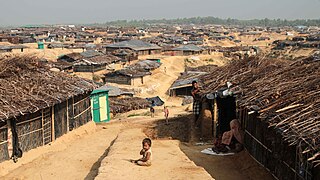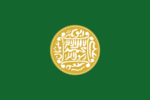
Aung San Suu Kyi is a Burmese politician, diplomat, author, and a 1991 Nobel Peace Prize laureate who served as State Counsellor of Myanmar and Minister of Foreign Affairs from 2016 to 2021. She has served as the chairperson of the National League for Democracy (NLD) since 2011, having been the general secretary from 1988 to 2011. She played a vital role in Myanmar's transition from military junta to partial democracy in the 2010s.

Myanmar or Burma, officially the Republic of the Union of Myanmar, is a country in Southeast Asia. Myanmar is bordered by Bangladesh and India to its northwest, China to its northeast, Laos and Thailand to its east and southeast, and the Andaman Sea and the Bay of Bengal to its south and southwest. Myanmar is the largest country in Mainland Southeast Asia and the 10th largest in Asia by area. As of 2017, the population was about 54 million. Its capital city is Naypyidaw, and its largest city is Yangon (Rangoon).

The National Association of Intercollegiate Athletics (NAIA) is a college athletics association for small colleges and universities in North America. For the 2020–21 season, it has 249 member institutions, of which two are in British Columbia, one in the U.S. Virgin Islands, and the rest in the conterminous United States. The NAIA, whose headquarters is in Kansas City, Missouri, sponsors 27 national championships. The CBS Sports Network, formerly called CSTV, serves as the national media outlet for the NAIA. In 2014, ESPNU began carrying the NAIA Football National Championship.

Human rights in Myanmar under its military regime have long been regarded as among the worst in the world. International human rights organisations including Human Rights Watch, Amnesty International, and the American Association for the Advancement of Science have repeatedly documented and condemned widespread human rights violations in Myanmar. The Freedom in the World 2011 report by Freedom House notes that "The military junta has... suppressed nearly all basic rights; and committed human rights abuses with impunity." In 2011 the "country's more than 2,100 political prisoners included about 429 members of the NLD, the victors in the 1990 elections." As of July 2013, according to the Assistance Association for Political Prisoners, there were about 100 political prisoners in Burmese prisons.

The Rohingya people are a stateless Indo-Aryan ethnic group who predominantly follow Islam and reside in Rakhine State, Myanmar. Before the displacement crisis in 2017, when over 740,000 fled to Bangladesh, an estimated 1.4 million Rohingya lived in Myanmar. Described by journalists and news outlets as one of the most persecuted minorities in the world, the Rohingya are denied citizenship under the 1982 Myanmar nationality law. There are also restrictions on their freedom of movement, access to state education and civil service jobs. The legal conditions faced by the Rohingya in Myanmar have been compared to apartheid by some academics, analysts and political figures, including Nobel laureate Bishop Desmond Tutu, a South African anti-apartheid activist. The most recent mass displacement of Rohingya in 2017 led the International Criminal Court investigating crimes against humanity, and led to the International Court of Justice investigating genocide.
There is a history of persecution of Muslims in Myanmar that continues to the present day. Myanmar is a Buddhist majority country, with significant Christian and Muslim minorities. While Muslims served in the government of Prime Minister U Nu (1948–63), the situation changed with the 1962 Burmese coup d'état. While a few continued to serve, most Christians and Muslims were excluded from positions in the government and army. In 1982, the government introduced regulations that denied citizenship to anyone who could not prove Burmese ancestry from before 1823. This disenfranchised many Muslims in Myanmar, even though they had lived in Myanmar for several generations.

Majulah Singapura is the national anthem of Singapore. Composed by Zubir Said in 1958 as a theme song for official functions of the City Council of Singapore, the song was selected in 1959 as the island's anthem when it attained self-government. Upon full independence in 1965, Majulah Singapura was formally adopted as Singapore's national anthem. By law, the anthem must be sung with Malay lyrics, but there are authorised translations of the lyrics of the anthem in Singapore's three other official languages: English, Mandarin Chinese and Tamil.

Insurgencies have been ongoing in Myanmar since 1948, the year the country, then known as Burma, gained independence from the United Kingdom. The conflict has largely been ethnic-based, with several ethnic armed groups fighting Myanmar's armed forces, the Tatmadaw, for self-determination. Despite numerous ceasefires and the creation of autonomous self-administered zones in 2008, many groups continue to call for independence, increased autonomy, or the federalisation of the country. The conflict is the world's longest ongoing civil war, having spanned more than seven decades.

USC Shoah Foundation – The Institute for Visual History and Education, formerly Survivors of the Shoah Visual History Foundation, is a nonprofit organization dedicated to making audio-visual interviews with survivors and witnesses of the Holocaust and other genocides, a compelling voice for education and action. It was established by Steven Spielberg in 1994, one year after completing his Academy Award-winning film Schindler's List. In January 2006, the foundation partnered with and relocated to the University of Southern California (USC) and was renamed the USC Shoah Foundation – The Institute for Visual History and Education. In March 2019, the institute opened their new global headquarters on USC's campus.

The Rohingya conflict is an ongoing conflict in the northern part of Myanmar's Rakhine State, characterised by sectarian violence between the Rohingya Muslim and Rakhine Buddhist communities, a military crackdown on Rohingya civilians by Myanmar's security forces, and militant attacks by Rohingya insurgents in Buthidaung, Maungdaw, and Rathedaung Townships, which border Bangladesh.

Malaysia–Myanmar relations are foreign relations between Malaysia and Myanmar. Both are the members of ASEAN and enjoy good relations. Although the relations become strained in late 2016 due to the Rohingya people issues, the relations remained stable after the meeting between both countries' armed forces chiefs to play down the issues. Myanmar currently has an embassy in Kuala Lumpur, and Malaysia has an embassy in Yangon.

Jammu is the winter capital of the Indian union territory of Jammu and Kashmir. It is the headquarters and the largest city in Jammu district of the union territory. Lying on the banks of the river Tawi, the city of Jammu, with an area of 240 km2 (93 sq mi), is surrounded by the Himalayas in the north and the northern-plains in the south. Jammu is the second most populous city of the union territory.

The Arakan Rohingya Salvation Army (ARSA), formerly known as Harakah al-Yaqin, is a Rohingya insurgent group active in northern Rakhine State, Myanmar. According to a December 2016 report by the International Crisis Group, it is led by Ataullah abu Ammar Jununi, a Rohingya man who was born in Karachi, Pakistan, and grew up in Mecca, Saudi Arabia. Other members of its leadership include a committee of Rohingya émigrés in Saudi Arabia.

The Rohingya genocide is a series of ongoing persecutions by the Myanmar military of the Muslim Rohingya people. The genocide has consisted of two phases to date: the first was a military crackdown that occurred from October 2016 to January 2017, and the second has been occurring since August 2017. The crisis forced over a million Rohingya to flee to other countries. Most fled to Bangladesh, resulting in the creation of the world's largest refugee camp, while others escaped to India, Thailand, Malaysia, and other parts of South and Southeast Asia, where they continue to face persecution.
Violent clashes have been ongoing in the northern part of Myanmar's Rakhine State since October 2016. Insurgent attacks by the Arakan Rohingya Salvation Army (ARSA) have led to sectarian violence perpetrated by Myanmar's military and the local Buddhist population against predominantly Muslim Rohingya civilians. The conflict has sparked international outcry and was described as an ethnic cleansing by the United Nations High Commissioner for Human Rights. In August 2017, the situation worsened and hundreds of thousands of refugees fled Myanmar into Bangladesh, with an estimated 500,000 refugees having arrived by 27 September 2017. In January 2019, Arakan Army insurgents raided border police posts in Buthidaung Township, joining the conflict and beginning their military campaign in northern Rakhine State against the Burmese military.

Rohingya refugees in Bangladesh mostly refer to Forcibly Displaced Myanmar Nationals (FDMNs) from Myanmar who are living in Bangladesh. The Rohingya people have experienced ethnic and religious persecution in Myanmar for decades. Hundreds of thousands have fled to other countries in Southeast Asia, including Malaysia, Indonesia, and Philippines. The majority have escaped to Bangladesh, where there are two official, registered refugee camps. Recently violence in Myanmar has escalated, so the number of refugees in Bangladesh has increased rapidly. According to the UN Refugee Agency (UNHCR), more than 723,000 Rohingya have fled to Bangladesh since 25 August 2017.

Kutupalong refugee camp is the world's largest refugee camp. It is in Ukhia, Cox's Bazar, Bangladesh, inhabited mostly by Rohingya refugees that fled from ethnic and religious persecution in neighboring Myanmar. It is one of two government-run refugee camps in Cox's Bazaar, the other being the Nayapara refugee camp.
The Hanifi Rohingya script is a unified script for the Rohingya language. Rohingya was first written in the 19th century with a version of the Perso-Arabic script. In 1975, an orthographic Arabic script was developed, based on the Urdu alphabet.

The Rohingya flag is the cultural and ethnic flag of the Rohingya people. Its use was first mentioned by Rohingya scholar and author A.F.K. Jilani, who documented its creation in the mid-20th century. On 20 May 2018, an updated version of the flag was created by the Rohingya Language Academy and released to the public; it is currently used by Rohingya diaspora communities around the world.

The Application of the Convention on the Prevention and Punishment of the Crime of Genocide , commonly referred to as the Rohingya genocide case, is a case currently being heard by the International Court of Justice (ICJ).

















